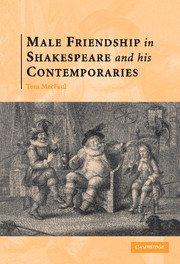Book contents
- Frontmatter
- Contents
- Acknowledgements
- Note on the text and list of abbreviations
- 1 True friends?
- 2 Momentary mutuality in Shakespeare's Sonnets
- 3 Friends and brothers
- 4 Love and friendship
- 5 Servants
- 6 Political friendship
- 7 Fellowship
- 8 False friendship and betrayal
- 9 Conclusion: ‘Time must friend or end’
- Notes
- Bibliography
- Index
7 - Fellowship
Published online by Cambridge University Press: 22 September 2009
- Frontmatter
- Contents
- Acknowledgements
- Note on the text and list of abbreviations
- 1 True friends?
- 2 Momentary mutuality in Shakespeare's Sonnets
- 3 Friends and brothers
- 4 Love and friendship
- 5 Servants
- 6 Political friendship
- 7 Fellowship
- 8 False friendship and betrayal
- 9 Conclusion: ‘Time must friend or end’
- Notes
- Bibliography
- Index
Summary
The friendship of exclusive pairs may be the ideal, but it is not the norm. The social world is more frequently made up of more complex interactions amongst groups, and Shakespeare's plays reflect this, more frequently giving us scenes of groups of men (three or more) rather than two-handers. We read the dramatic and social status of individuals on the basis of their centrality (or otherwise) to their group, and get a sense of their sociability from the size of the group around them; the group can attenuate the self-assertion of the individual, but can also give the individual a clearer shape; shifting power relations in the group are crucial to this, allowing individuals to develop new kinds of prominence. Often the only claim to friendship that these groups have is that they share some goal or interest in common; sometimes they are simply thrown together by chance. I shall reflect the vagueness of these groupings by calling them fellowships. Montaigne says that ‘There seems to be nothing for which nature has better prepared us than for fellowship’, though it is much lower than perfect friendship – which can emerge from it. The emergence of special individual connections within fellowship is always rather embattled. C. S. Lewis says that ‘companionship’ is not the same as friendship, though it is its matrix. Fellowship, then, is one of the inevitable features of life, but its relationship to friendship is complicated.
- Type
- Chapter
- Information
- Male Friendship in Shakespeare and his Contemporaries , pp. 141 - 168Publisher: Cambridge University PressPrint publication year: 2007



